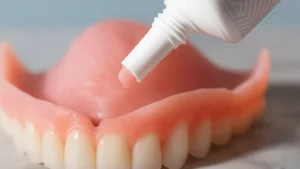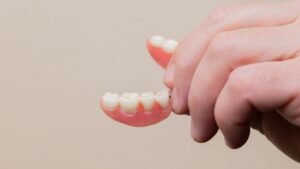Finding the right gum for dentures can feel like navigating a minefield. You want fresh breath and the satisfaction of chewing, but you’re worried about damaging your dentures or creating an embarrassing sticky situation.
The good news? Plenty of denture wearers enjoy chewing gum regularly without any problems. The key is knowing which products work best and how to chew safely.
This guide covers everything you need to know about chewing gum with dentures, from the safest options available to practical tips that’ll keep your dentures secure and comfortable. Whether you’re new to dentures or looking to switch up your current routine, you’ll find actionable advice that makes a real difference.
Can You Chew Gum with Dentures?
Yes, you absolutely can chew gum with dentures! This might surprise you if your dentist warned against it years ago, but modern sugar-free gum for dentures has come a long way.
The old advice against chewing gum came from concerns about sticky, sugar-laden gums that could pull dentures loose or get trapped underneath. Those worries made sense with older gum formulations, but today’s denture-safe gum brands are specifically designed to avoid these problems.
However, not all gums are created equal. Regular sugary gum can still cause issues by sticking to denture materials and feeding harmful bacteria in your mouth. That’s why choosing the right type matters so much.
The secret lies in selecting gum safe for dentures that won’t stick, won’t damage your dental work, and actually provides benefits like fresher breath and increased saliva production. Many denture wearers find that the right gum actually helps their dentures feel more secure by encouraging natural jaw movement and saliva flow.
Your success with gum largely depends on how well your dentures fit and your chewing technique. Well-fitting dentures that create a good seal work best, while loose dentures might shift more during chewing.
What to Look for in Gum That’s Safe for Dentures
Shopping for best gum for denture wearers requires focusing on three key features that separate safe options from problematic ones.
Sugar-Free Formula
Sugar-free gum for dentures isn’t just better for your overall health – it’s essential for denture wearers. Sugar feeds bacteria that can cause infections, especially if particles get trapped under your dentures.
Look for gums sweetened with xylitol, sorbitol, or other sugar alcohols. Xylitol actually fights bacteria and can help prevent cavities in any remaining natural teeth. These sweeteners also don’t break down into the sticky residues that traditional sugar creates.
The American Dental Association recommends sugar-free gum for everyone, but it’s particularly important when you’re dealing with the unique challenges of dentures.
Non-Stick Formula
This is where modern gum for dentures really shines. Today’s best options use advanced polymer bases that stay flexible without becoming overly sticky.
Traditional gum bases could grab onto denture materials, especially if your dentures have rough spots or worn areas. Non-stick formulations glide over dental work without adhering, even after extended chewing.
Some brands specifically market their products as denture-safe, but you can also identify non-stick options by looking for terms like “easy removal” or “won’t stick to dental work” on packaging.
Gentle on Dental Work
The best chewing gum with dentures won’t put excessive pressure on your denture fit or irritate your gums. This means avoiding extra-tough or hard-to-chew varieties that require aggressive jaw action.
Look for gums that soften quickly and maintain a comfortable chewing consistency. Your jaw muscles and gum tissues will thank you, especially during longer chewing sessions.
Some gums also include ingredients like aloe or other soothing agents that can actually benefit irritated gum tissues common among new denture wearers.
Best Gum for Denture Wearers
Here are three top-rated options that consistently earn praise from denture wearers and dental professionals alike.
Trident Sugar-Free Gum
Trident has earned its reputation as one of the most reliable denture-safe gum brands available. Their sugar-free varieties use xylitol as a primary sweetener, which actively fights bacteria while you chew.
The texture strikes an ideal balance – soft enough for comfortable extended chewing, but firm enough to provide satisfaction. Multiple flavors mean you won’t get bored, and the long-lasting taste keeps your mouth feeling fresh for hours.
Denture wearers particularly appreciate how cleanly Trident removes from dental work. Even if small pieces break off, they typically dissolve quickly rather than sticking to denture surfaces.Check price on Amazon
Orbit Sugar-Free Gum
Orbit’s advanced polymer base makes it another excellent choice for gum safe for dentures. The brand focuses heavily on non-stick technology, which shows in how easily it releases from denture materials.
Their variety of flavors includes some specifically marketed for lasting freshness, which can be particularly helpful if you deal with dry mouth – a common issue for denture wearers.
The texture starts slightly firmer than Trident but softens to a very comfortable consistency within the first minute of chewing. This makes it easier on jaw muscles that might be adjusting to dentures.Check price on Amazon
Extra Sugar-Free Gum
Extra brings some unique benefits to the best gum for denture wearers category. Their formulation includes ingredients that specifically promote saliva production, which helps keep dentures more secure and comfortable.
The brand offers several varieties, including ones with whitening agents that can help maintain the appearance of dentures. While these won’t dramatically change denture color, they can help prevent staining from coffee, tea, or other beverages.
Extra’s texture tends to be softer than average, making it particularly comfortable for people still adjusting to dentures or those with sensitive gum tissues.Check price on Amazon
Benefits of Chewing Denture-Safe Gum
The right sugar-free gum for dentures offers several advantages that go beyond just enjoying the act of chewing.
Freshens Breath Naturally
Bad breath can be more challenging with dentures, especially if food particles get trapped or if you’re dealing with dry mouth. Quality gum provides immediate freshening and helps maintain it throughout the day.
The chewing action itself helps dislodge food particles that might be stuck around denture edges. Combined with antimicrobial ingredients like xylitol, this creates a powerful one-two punch against odor-causing bacteria.
Many denture wearers find that regular gum chewing gives them more confidence in social situations where close conversation might otherwise cause anxiety about breath freshness.
Helps Combat Dry Mouth
Dry mouth affects many denture wearers, often as a side effect of medications or simply due to age-related changes. This condition makes dentures less comfortable and can lead to sore spots.Chewing gum with dentures stimulates natural saliva production, which helps keep your mouth moist and your dentures better sealed. More saliva also means better protection against bacteria and improved overall oral health.
The mechanical action of chewing activates salivary glands more effectively than many other dry mouth treatments, making it a simple but powerful tool for comfort.
Encourages Healthy Saliva Flow
Beyond just combating dryness, increased saliva flow from gum chewing provides multiple health benefits. Saliva helps neutralize acids that could damage remaining natural teeth and helps wash away food particles.
For denture wearers, proper saliva flow also helps maintain the suction that keeps dentures in place. This is particularly important for lower dentures, which rely more heavily on muscle control and saliva for retention.
Regular chewing also exercises jaw muscles, which can help maintain bone density and facial structure – important considerations for long-term denture wearers.
Improves Denture Retention
This benefit surprises many people, but gum safe for dentures can actually help keep them in place better. The increased saliva production improves the seal between dentures and gums.
The gentle jaw movement from chewing also helps you become more aware of your denture position and develop better muscle memory for keeping them stable during eating and speaking.
Some denture wearers report that regular gum chewing helps them feel more natural and confident with their dentures, leading to improved quality of life overall.
Tips for Chewing Gum with Dentures Safely
Even with the best gum for denture wearers, technique matters. These practical tips will help you enjoy gum safely and comfortably.
Start Slow and Build Up
If you’re new to chewing gum with dentures, begin with just a few minutes at a time. This gives your jaw muscles time to adjust and helps you learn how your dentures respond to the chewing motion.
Pay attention to how your dentures feel during and after chewing. Some movement is normal, but if you notice significant shifting or discomfort, try a different gum or adjust your technique.
Gradually increase chewing time as you become more comfortable. Most experienced denture wearers can enjoy gum for 15-20 minutes without any issues.
Use Gentle, Even Pressure
Aggressive chewing can shift dentures or irritate sensitive gum tissues. Instead, use steady, moderate pressure that feels natural and comfortable.
Distribute chewing evenly between both sides of your mouth when possible. This helps maintain denture stability and prevents excessive wear on one side.
If you feel your dentures starting to shift, pause and readjust them before continuing. This is normal during the learning process.
Choose the Right Timing
Gum for dentures works best when your mouth is already comfortable. Avoid chewing when your dentures feel loose, when your gums are irritated, or immediately after applying denture adhesive.
Mid-morning or mid-afternoon often work well, when your mouth has adjusted to your dentures for the day but before fatigue sets in.
Some people find that chewing gum after meals helps with the transition from eating to regular activities, as it exercises the same muscles in a gentler way.
Know When to Stop
Remove gum immediately if you experience any pain, significant denture movement, or if the gum becomes too sticky. Quality denture-safe gum brands shouldn’t cause these problems, but individual reactions can vary.
Most sugar-free gums lose their flavor and elasticity after 15-20 minutes of chewing. This is actually ideal timing for denture wearers, as it prevents overexertion of jaw muscles.
If you notice any residue on your dentures after removing gum, clean them thoroughly before reinserting. This prevents buildup that could affect fit or comfort.
Maintain Proper Denture Hygiene
Regular cleaning becomes even more important when you’re chewing gum with dentures. Even non-stick gums can leave trace residues that build up over time.
Rinse your mouth thoroughly after chewing, and clean your dentures according to your normal routine. Pay extra attention to areas where gum might have contacted the denture surface.
Consider using a denture cleaning tablet occasionally for deeper cleaning, especially if you chew gum regularly. This helps prevent any potential buildup of sweeteners or other gum ingredients.
Common Concerns About Gum and Dentures
Many denture wearers have specific worries about chewing gum. Let’s address the most frequent concerns with practical advice.
Will Gum Damage My Dentures?
Modern sugar-free gum for dentures won’t damage properly maintained dentures. The materials used in both gum and dentures are designed to be compatible.
However, very old dentures with cracks, rough spots, or loose parts might be more susceptible to problems. If your dentures need repair or replacement, address those issues before starting a gum routine.
Quality gum actually poses less risk to dentures than many foods people eat regularly. Sticky candies, tough meats, and hard foods create much more stress on denture materials.
What If Gum Gets Stuck?
With proper denture-safe gum brands, sticking shouldn’t be a significant problem. If it does happen, don’t panic or try to pull aggressively.
Remove your dentures if possible and use warm water to help soften any stuck gum. Gentle rubbing with a soft brush usually removes residue without damage.
Ice can also help harden stuck gum for easier removal, though warm water is typically more effective and comfortable.
Can Gum Affect Denture Adhesive?
Gum safe for dentures typically doesn’t interfere with quality denture adhesives. However, timing matters – allow adhesive to set fully before chewing gum.
Some people find that regular gum chewing actually reduces their need for adhesive by improving natural saliva production and denture retention.
If you use zinc-containing adhesives, monitor your total zinc intake, as some gums also contain small amounts. This is rarely a practical concern, but worth awareness for heavy users of both products.
Is It Safe for Partial Denture Wearers?
Chewing gum with dentures can actually be easier for partial denture wearers, as remaining natural teeth provide additional stability and chewing surface.
Pay attention to the interface between natural teeth and partial dentures, as this is where food particles and gum residue are most likely to accumulate.
Partial denture wearers often have more flexibility in gum choices, as they’re not relying entirely on denture materials for chewing surface.
Alternatives to Traditional Gum
If regular gum for dentures doesn’t work for your specific situation, several alternatives can provide similar benefits.
Xylitol Mints
Sugar-free mints with xylitol offer many of the same breath-freshening and bacteria-fighting benefits as gum without requiring chewing.
They dissolve slowly, providing extended flavor and saliva stimulation. This can be particularly helpful for people with very loose dentures or jaw discomfort.
The downside is less mechanical cleaning action and jaw exercise compared to actual chewing.
Dental Chews
Some companies make soft, dissolvable chews specifically designed for denture wearers. These provide the satisfaction of chewing with even less risk than gum.
Dental chews often include additional beneficial ingredients like vitamins or breath-freshening agents tailored to oral health needs.
They tend to be more expensive than regular gum and offer fewer flavor options.
Orthodontic Wax
For people who primarily want something to chew for stress relief or habit satisfaction, orthodontic wax can provide a safe option.
It’s flavorless and designed to be completely safe if swallowed in small amounts. The texture provides chewing satisfaction without any sticking concerns.
This option doesn’t offer the breath-freshening or oral health benefits of quality gum, making it more of a pure chewing substitute.
Making the Right Choice for Your Needs
Selecting the best gum for denture wearers depends on your individual circumstances, preferences, and oral health needs.
Consider your denture fit first. Well-fitting, stable dentures open up more gum options than loose or problematic ones. If your dentures need adjustment, address that before establishing a gum routine.
Think about your primary goals. If fresh breath is your main concern, prioritize gums with strong, long-lasting flavors and antimicrobial ingredients. For dry mouth relief, focus on options that promote saliva production.
Your jaw strength and comfort level also matter. People new to dentures or those with jaw sensitivity should start with softer options and build up gradually.
Budget considerations are practical too. While premium denture-safe gum brands offer advantages, many affordable options work well for regular use.
Final Thoughts & Buying Advice
Gum for dentures can be a valuable part of your daily oral care routine when chosen wisely and used properly. The key is selecting products specifically designed to work with dentures while providing the benefits you’re seeking.
Start with one of the recommended sugar-free gum for dentures options like Trident, Orbit, or Extra. These brands have proven track records with denture wearers and offer the safety features most important for success.
Remember that even the best gum safe for dentures requires proper technique and timing. Begin slowly, pay attention to your dentures’ response, and stop if you experience any problems.
The investment in quality denture-safe gum brands pays off in improved confidence, better oral health, and enhanced daily comfort. Many denture wearers find that regular, safe gum chewing actually helps them feel more natural and comfortable with their dental work.Ready to try denture-safe gum? Check the prices and reviews for our top recommendations on Amazon to find the perfect option for your needs.
Don’t let dentures keep you from enjoying simple pleasures like fresh breath and satisfying chewing. With the right products and approach, chewing gum with dentures can be both safe and beneficial for your overall oral health and quality of life.



